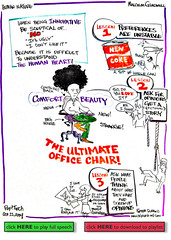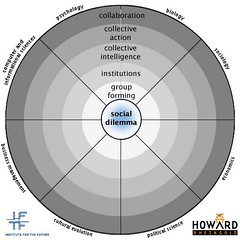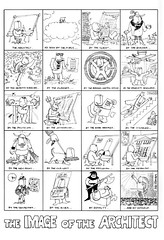Wednesday, May 31, 2006
Decker Marketing: Guy Kawasaki's Thoughts on Blogging
Decker Marketing: Guy Kawasaki's Thoughts on Blogging
Google calendar - A disruptive application
 Ajit Jaokar scores again with a very perceptive piece on Google's Calendar application. He posits that the combination of the key calendar app with writely and its seeding in the outsourcing comunities will generate a disruption for Microsoft's monopolistic Office hegemony - not in time to fully disrupt Vista, but a wedge in Web-based collaborative software tools that will be attractive to corporate users who will migrate away from MS Office to Google's collaboration platform over time.
Ajit Jaokar scores again with a very perceptive piece on Google's Calendar application. He posits that the combination of the key calendar app with writely and its seeding in the outsourcing comunities will generate a disruption for Microsoft's monopolistic Office hegemony - not in time to fully disrupt Vista, but a wedge in Web-based collaborative software tools that will be attractive to corporate users who will migrate away from MS Office to Google's collaboration platform over time.Open Gardens: Google calendar - A disruptive application
Mobile Network is the Computer
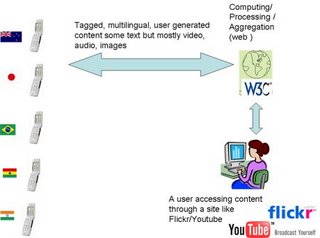
From Ajit Jaokar at Futuretext. He makes the point that with 2Billion mobile network units in use versus 1Billion Internet users who access the net via a laptop or desktop, there is a huge opportunity in multilingual, non-textual collaboration and media creation that operates at a "higher level in the stack" and that lightweight Web 2.0 applications designed for the mobile network has great potential for innovation. India, South Korea and Japan lead in this new mobile convergence.
Open Gardens:
Tuesday, May 23, 2006
Blogjects, Thinglinks and Theory Objects? Bruce Sterling on Language

This is a really entertaining talk from ETech 2006 that could be a great test case for the utility of TI - It would be nice to have the presentation slides. Can Sterling be captured in muralized form? IT Conversations: Bruce Sterling - The Internet of Things
Phil windley's introductory text on ITC does a good job of distilling the talk. Read and then listen again to capture clips. The full talk is 57 minutes and there are a number of "pull quotes" that could drive the image creation. It would be a real exercise to image a talk on language.
Evil Genius Chronicles � Bruce Sterling on the Internet of Things
O'Reilly Emerging Technology Conference - March 6-9, 2006 - San Diego, CA
My next post will comment on DTF as a too-slick approach to podcasting audio recordings.
O'Reilly Emerging Technology Conference - March 6-9, 2006 - San Diego, CA: "As Herbert Simon wrote in Computers, Communications and the Public Interest in 1971, 'What information consumes is rather obvious: it consumes the attention of its recipients. Hence a wealth of information creates a poverty of attention, and a need to allocate that attention efficiently among the overabundance of information sources that might consume it.'"
The Attention Economy resulting from the poverty of attention described above is the basic rationale for Thoughts Illustrated approach to podcasting. Better test the concept as thoroughly as possible.
AmigoFish: Catch What You Love
A service for profiling what you like in podcast and vblogs and automatically feeding you other podcasts and vblogs that match your profile. Doug Kaye forwarded this.
Friday, May 19, 2006
MeshForum 2006 Review Continued - Breaking Up Old Networks

A lively exchange between Jamais Cascio and Howard Greenstein which turned out to be a live presentation journey through the new world of mashups. This was one of the most insightful perspectives on this subject and fit it well with one of my reasons for attending MeshForum.
Introducing the concept of mashups using an audio mix of two different songs didn't quite make the point, but the follow-on presentation around the world of mashups controlled by Jamais on his laptop/projector was pretty impressive. I will need to listen to the audio to screen for the nuggets which I hope to mashup with Eileen Clegg's full mural which you can see here: BreakingUpD.jpg (JPEG Image, 1000x600 pixels) - Scaled (76%)
Tuesday, May 16, 2006
An Inconvenient Truth - Creating Buzz for Al Gore's documentary
An Inconvenient Truth
Say a prayer or send some TLC vibes to Robert Scoble
Monday, May 15, 2006
Connecting in Conversation - Design for a MMP game.
Critt's MMP game concept is based on the theme from Tom Barnett- "disconnectedness means danger" which is outlined in a sketch Critt drew during a breakout session at the Harvard event.
I have clipped the sketch and will annotate it on flickr and post it later today with a draft drawing of the game "platform" that may explain his game concept more clearly.
This link will take you to Critt's Newsvine article which, if you are interested in following his journey toward Connecting in Conversation through gaming, will explain the origins of his thinking and thus the game concept.
Newsvine - Connecting in conversation: Gaming as public media platform
As the sketch in the Newsvine article suggests, the game would be targeted at augmenting the networked connectivity of the Second Superpower - Wikipedia, the free encyclopedia
Sunday, May 14, 2006
Naked Conversations Page 220 : with a surprise link
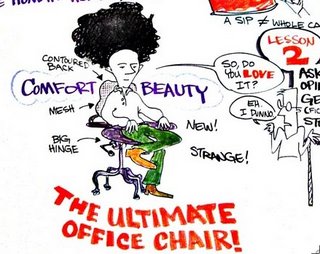
From Page 220 Naked Conversations
"One example that demonstrates how podcasting might work for an enterprise is ITConversations’ recording of Blink author Malcolm Gladwell’s talk at PopTech, a popular conference that blends technology and sociological thinking. When he spoke in October 2004, Gladwell was well received by 500 mostly paying attendees. Over the next 10 months, 67,000 people listened to the podcast version of his talk. Gladwell spoke for free at PopTech, even though elsewhere at the time he was receiving as much as $40,000 per speech.By August 2005, his asking price had gone up to $60,000, and he was among the most sought-after speakers on the circuit. His new book is significantly outpacing his earlier book in sales. Meanwhile, event though PopTech raised its registration rates for its 2005 conference, the event sold out for the first time in its nine-year history*, and there was a waiting list. Is there a measurable quid-pro-quo here? It’s not provable. But one can assume that both Gladwell and the conference producers have not been hurt by giving it away".
* Note: IT Conversations podcasted the entire PopTech Conference at which Gladwell spoke ( 26 speakers) and recorded PopTech 2005 as well. Follow the link Alphachimp Tour: Graphic Facilitation to the PopTech 2004 conference and enjoy my friend Peter Durand’s great graphic illustrations and link there to the recorded speeches on the IT Conversations Podcast Network.
Worldmapper: Details of the Mashup

Worldmapper: The world as you've never seen it before
Click on the link to see the data sources and the variety of ways you can portray the maps on Worldmapper.
Worldmapper: The world as you've never seen it before

Here's a new way to look at the world.Courtesy of a link from ssgraphics Click on the link to explore. This s a breakthrough in visualizing the world
Worldmapper: The world as you've never seen it before
MeshForum - Node in the Participant's Network

This is one of the 40 nodes in the "network" that Dave Gray and Dawn architected. I will have to get the photo of the entire network collage to make sense of the linkages.
Perhaps a tool like flickrgraph would do the trick.
I am waiting to get the audio recording of this session from Shannon Clark to be able to link from the Listen button to the audio .Flickr: The flickrtalk Pool
Saturday, May 13, 2006
A "weather map" of the Blogosphere "Hurricane"

In September 2004 I was being overwhelmed by the emergent behavior of the Omidyar Network which was just getting off the ground. In this post on the ONet, I pleaded for a way to SEE the order emerging from the Net as it progressed on its path.
"A 2 screen visualization one for GIS and the other for Topic maps would provide potential for geobrowsing and display of complex information with geolocation metadata, and topic maps could provide a non-geographical visualization concurrently. Seing both at once either for interactive access or passive display would be very powerful. If there is a desire to avoid imposing ontological order on the network content, visualizations like these could provide a 'weather map' of where this hurricane is headed. The opportunity to SEE order emerging from complexity would provide us a truly unique way of understanding O.net." Click below to see the original post on ONet.
Comment by dave davison
This ability to SEE ties in with Manuel Lima's beautiful MeshForum presentation and his visualizing complexity website and with Shel Israels' post on the difficulty of visualizing "avenues of influence" on the blogosphere.
At this moment I am concerned about going "live" in the blogosphere without having a visual map with which to both simulate and actively follow the emergent properties of my own journey into this unknown territory. The fear is to trigger unintended consequences of putting the blog into syndication. Maybe I am just being overly cautious and should just "let it roll" as my friend Tom Munnecke does on ONet. Dee Hock would call this process chaordic. I call it
free fall.
Friday, May 12, 2006
MeshForm2006 - Review
1. Meet the key participants and presenters and contribute where I could.
2. Watch Eileen Clegg in action (she provided a visual journal of the presentations on Monday May 8th) Eileen was awesome, as her work to be shared with you in later posts will attest.
3. Pursue the opportunity of working with Eileen, several of the presenters and Shannon Clark (the event convenor) to establish a working relationship for co-creation of a Thoughts Illustrated synthesis of the event which I would share with the event participants and whomever linked to the Thoughts Illustrated blog or wherever we might decide to post it. This post is a start in that direction.
Because the event had a relatively small audience, it was a perfect size for meeting just about everyone present and to be a witness the birth of a new and, I believe, soon-to-be powerful collaborative community. MeshForum delivered way more than I had expected going in, and I hope sharing my reflections and observations about the event will be of some use to you as well.
I did not have the time to attend every event, but I will list those that I did in chronological order below and return to edit this post with links to the locations on this blog where the specific posts for each item can be found. Although they will also be listed in the blog's archive I felt providing direct links here would be helpful.
There was a lot more to MeshForum and its bright and engaging presenters and participants than I could ever hope to capture here. To all of you who happen to drop by this personal journal of MeshForum, please know that I am solely reponsible for the content and the opinions here are mine alone. I welcome your comments.
Session List: I have copied portions of this list from the Meshforum website, so until I have posted a review, the original links to the presenters will remain. Eileen only visualized the Monday sessions, so there are no accompanying graphics for the Sunday presentations. I will try to identify the sessions I have reviewed in green. Naked Conversations is the first review.
Sunday May 7th
Opening Keynote - Manuel Lima, founder of VisualComplexity.com
Manuel's presentation was what a keynote should be - since visualization was a primary theme of MeshForum. Manuel's selection and comparisons of his comprehensive collection of visualization projects was an eye-opener. I suggest that the MeshForum community submit examples of interesting visualization projects to add to Manuel's growing collection.
Manuel's ability to take a meta-level view of the collection to highlight emerging pattern commonalities amongst the visualizations makes his a very valuable set of eyeballs - As Alan Kay is reported to have said "Perspective is worth 80 IQ points" - so Manuel is a very smart hombre indeed and Shannon was very smart to put this presentation in first position to start the conference.
I vote for Manuel to return next year with an update on his project. Visualizing Complexity really is a proof statement that " picture is worth a thousand words".
Naked Conversations, the corporation in a blogging world
Thoughts Illustrated: Meshforum - Scoble and Israel on Naked Conversations
Large Scale Social Networks - Anil Dash of Six Apart
Art of Networks - Spot Draves, ElectricSheep
Monday May 8th
The Economics of Transportation Networks, Dr. David Levinson, University of Minnesota
Political Networks, managing large scale Social Networks, Jon Lebkowsky, worldchanging.com, Zack Rosen, CivicSpace Labs
Value Networks - Verna Allee
Visual Thinking workshop led by Dave Gray and Dana Smith of Xplane
Breaking old Networks - Jamais Cascio and Howard Greenstein
Social Network Analysis, Dr. Karen Stephenson, Netform
Tuesday May 9th
On Tuesday the format is Open Space (or unconference format) with multiple small group discussions and workshops. As topics and session organizers come forward, we will post the topics here and on the wiki but sessions are open to all attendees and anyone may propose a session to open.Opening of the Space, Michael Herman
I wish I could hire this guy

this is the link Fill 'Er Up 5/3/06to the latest Mark Fiore cartoon - It would be neat if we could keep the playback of the cartoon "in the frame" of the TI post rather than linking away.
For example, on the email alert containing a jpeg of his cartoon, clicking on the jpeg starts the cartoon.
hooked on Gladwell - was this what flickrtalk was supposed to do?

Help! This all started as a "quick"test of the flickrtalk "mashup" concept using random clips (for now) of Malcolm's speech at PopTech 2004 and Peter Durand's graphical interpretation of that speech - well, no - it really all starts with my conversation with Doug Kaye, the executive director of the Conversations Network about my starting a new channel on CN.
The idea was to save podcast listener's time by breaking up the speech into the important sound bites from the full audio podcast on CN and use a graphical interface that "pictured" the speech in one holistic image.
And now I have spent 30 minutes rummaging around in Malcolm's blog to satisfy my curiosity about this remarkable writer/speaker.gladwell dot com - disclosure statement
So does flickrtalk do the job of helping a prospective listener to the podcast decide whether to download it to his/her playlist - or does it take them on a surfing expedition?
Thursday, May 11, 2006
flickrtalk
See my previous posts on the concept or click on the photo at the right which will take you to the flickrtalk testing page on flickr.
Meshforum - Scoble and Israel on Naked Conversations

Robert and Shel provided a personal story of writing the book online and some anecdotes from their experiences in the blogosphere. Both were easy-going in their interaction with the rather sparse crowd- and everyone got a copy of the book as a reward for listening. I will have to listen to the audio to see if there is enough substance for the podcast on IT Conversations and will add clips on flickrtalk when Dave Gray and I have got it ready for real users.
See my later post for a useful clip from Naked Conversations that demonstrates how podcasting might work for an enterprise Thoughts Illustrated: Naked Conversations Page 220 : with a surprise link
Mapping the avenues of influence in the blogosphere
He considers the complexity of the global map of a company's avenues of influence beyond anything Manuel has yet encountered. Seems to me that, as the co-author of Naked Conversations, Shel ought to be able to envision what he wants the map to portray - with that design criteris the task should be doable.
I was blown away when I first came upon Visual Complexity, and listening and watching Manuel's presentation Sunday at MeshForum opened my eyes to possible ways to construct such maps.
I think this is worth investigating and will post when I find a suggested solution.
Wednesday, May 10, 2006
castingWords.com - Podcast Transcripts
TVEyes podscope
Saturday, May 06, 2006
malcolm 2
Attention is scarce - and the web is overflowing with content and searching for just what you need or might want is difficult - even more so with finding useful, informative or enjoyable audio podcasts for your iPod or mp3player.
This post features a mashup from blogspot to flickr to take advantage of the flickr'Note'function to demonstrate the use of "clickable" graphics to save prospective listeners
time in searching for podcasts they might like to hear in full.
A click on the image at the right will take you to the same image in my photo gallery at flickr.
Clicking on that image will reveal several small transparent boxes. Mouse over the box and it will present a note and a link. The audio links to Malcolm's speech that you will link to are just random clips - in "production"the clips would be salient sound bites (edited to be clean and crisp snippets and directly related to the relevant segment of the graphic.)
A further refinement would be the addition of a tag cloud containing the key tags for the speech/graphic providing links to the same audio clips.
The green link at the bottom of the image is live, the red one is still not linked up, but would connect the user to his personal playlist queue, where just one click would add the full podcast to the user's playlist for later listening.
Hopefully this process will both save valuable time in searching the podcast spectrum and make the process of doing so more engaging and lead listeners to the good stuff that is otherwise not easily findable.
I intend to use Thoughts Illustrated to "host" a continuing series of minicasts where the graphics, tagclouds and linking to the sound bites would all be contained as integrated elements within the blogpost frame.
Thursday, May 04, 2006
CooperationInterdisciplineMap
Wednesday, May 03, 2006
Tuesday, May 02, 2006
visualcomplexity.com | A visual exploration on mapping complex networks
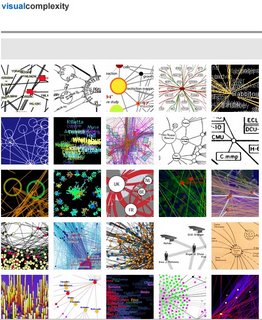
A visual thumbnail for 324 projects of VCvisualcomplexity.com | A visual exploration on mapping complex networks
A history of Graphic Facilitation

Make Your Mark :: Graphic Facilitation :: Articles
This article is an attempt to answer the question of "Where DID this way of working come from? What are the historical roots of your field? Questions that I get asked as I go about my work in my own graphic facilitation and graphic coaching practice . . .
Click on the "read more" link on Christina's website to download the pdf file.
The technologies of Cooperation
Resources — CooperationCommons
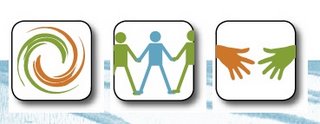
Technologies of cooperation each reflect an important shift in the structural qualities of cooperative organizations—a shift from explicit design of systems to providing platforms for tool creation and system emergence. Wikipedia, eBay, FreeCycle,
Open Source, synchronous swarms, and smart mobs were not designed, but rather they emerged from the intentional creation of tools and platforms for interaction and value exchange.
This is an important distinction because it also shifts the role of leadership and management from an authority who explicitly shapes direction to a catalyst and periodic intervener who sets conditions and frameworks for interactions.
Tags
- 37signals (1)
- academyawards (1)
- afghanistan (1)
- aging (1)
- alanwatts (1)
- AlGore (1)
- alltop (1)
- altus (1)
- amazon (1)
- andreeson (1)
- AndrewWebster (1)
- animated timelapse (1)
- animatedtimeline (1)
- anttrails (8)
- anweringwhy? (1)
- AORTA (3)
- apple (6)
- appropriatetechnology (1)
- aquaduct (1)
- armano (7)
- armano edelman digitalembassies (1)
- art (1)
- arthistory (1)
- artkleiner (1)
- assignmentzero (1)
- attentionsavings (2)
- audio (1)
- Autodesk (2)
- backofthenapkin (2)
- badlanguage (1)
- barack (1)
- Bell-Mason (1)
- bicyclepoweredwaterpurifier (1)
- BIGVIZ (3)
- BillDaul (1)
- biotech (1)
- BJFogg (1)
- blendedvalue (1)
- blogger (1)
- blogging (3)
- bobjohansen (1)
- bonniedivarco (1)
- bookpromotion (2)
- breakthrough (1)
- Brenman (1)
- bucky fuller (1)
- Business (1)
- Calligraphy (1)
- capsbots (1)
- capsbotsKarenStorer (1)
- Carl Jung (1)
- changethis (1)
- charlierose (1)
- chasm (1)
- Churchill Club (2)
- churchofthecustomer (1)
- cisco (1)
- ciscohumannetwork (3)
- citizenjournalism (1)
- clickablemurals (1)
- clippingtool (1)
- Cloudcomputing (1)
- cluetrain (1)
- CMU (1)
- cocheu (1)
- codesign (1)
- colaboration (1)
- colabria (3)
- collage (1)
- collegestartups (1)
- commoncraft (2)
- communityportals (1)
- compression (1)
- conceptualage (1)
- conceptworkers (1)
- consciousness (1)
- continuouspartialattention (6)
- convergence (1)
- conversationalarchitecture (3)
- conversationbase (3)
- cpa (5)
- creativedesign (1)
- crowdsourcing (3)
- crowley (1)
- culturalcapitalism (1)
- cyberbrain (1)
- cybergenicedge (1)
- dachis (1)
- danfarber (1)
- Danielrobles (2)
- danroam (2)
- danward (1)
- dataviz (1)
- dataweb (1)
- David Armano (1)
- DavidBrooks (2)
- davidsiegel (1)
- davidweinberger (1)
- deepphilosophy (1)
- defrag (2)
- dennett (1)
- deragon (1)
- design (1)
- diagram (4)
- dickhardt (1)
- Digg (1)
- DKR (1)
- dontapscot (1)
- dontapscott (4)
- DougRushkoff (1)
- dynabook (1)
- ebook (1)
- ecosystem (1)
- Edelman Digital (1)
- editthisbook (1)
- eileenclegg (1)
- elearning (3)
- engelbart (1)
- entrepreneurship (1)
- EricaDriver (1)
- estherdyson (1)
- EU (1)
- everythingismiscellaneous (1)
- evolutionofcommunication (1)
- ExperienceStrategy (1)
- facebook (8)
- facereviews (1)
- failure (1)
- fairuseicon (1)
- fastcompany (1)
- FastTalk (1)
- faulk (1)
- federalbudget (1)
- filter (1)
- filtering (1)
- firmage (1)
- Fisch (1)
- flipboard (2)
- flow (2)
- focus (1)
- forecasting (1)
- Forrester (1)
- frameworks (1)
- friedman (1)
- futureinternet (1)
- futureofmedia (1)
- futureofthebook (2)
- galaxies (1)
- garrreynolds (3)
- geodome (1)
- GeoffMoore (1)
- gettyimages (2)
- globalization (1)
- google (4)
- googleartproject (1)
- googleimages (2)
- googlemaps (1)
- graphicfacilitation (3)
- gratefulness (1)
- Grazr (3)
- GTD (2)
- GUIrevolution (1)
- guykawasaki (1)
- hapticdisplay (4)
- headlemur (1)
- hubble (1)
- humor (1)
- i (1)
- icosystems (1)
- identitydisclosure (1)
- IDEO (1)
- ifbook (2)
- ifit (1)
- IFTF (1)
- iinnovate (1)
- imagemaps (1)
- images (1)
- immersiveenvironments (1)
- inaugurationspeech (1)
- Indexed (1)
- infographic (1)
- Information architecture (1)
- Information is Beautiful (1)
- informationanxiety (2)
- informationarchitect (1)
- Informationdesignstudio (1)
- informationvisualization (4)
- ingenesist (1)
- innovation (4)
- innovationeconomics (1)
- Innovationlabspublications (1)
- intelligence (1)
- intervention (1)
- ipad (3)
- iPhone (8)
- iTunes (2)
- Jay Cross (1)
- jerrymichalski (2)
- jess3 (1)
- jessicaHagy (1)
- JibJab (1)
- jimbowales (1)
- jimschuyler (1)
- joanpas (1)
- jobs (2)
- JoeSterling (1)
- John Hagel (2)
- John Seely Brown (2)
- JohnAbele (1)
- JSB (1)
- karenbennett (1)
- KatieCouric (1)
- kawasaki (2)
- kevinkelley (2)
- keyframes (1)
- kids (1)
- kimpolese (2)
- kindle (1)
- KingbridgeConferenceCentre futureofconferences (1)
- Knowledge base (1)
- L+E (1)
- lastlecture (1)
- leelefever (1)
- letgo (1)
- libert (1)
- LifeInc. (1)
- lifelessons (2)
- lifestream (1)
- lifestreams (3)
- lindastone (1)
- linkedin (1)
- lisahaneberg (1)
- logic+emotion (2)
- longtail (1)
- looselycoupled (1)
- luck (1)
- maloney (1)
- many eyes (1)
- manyone (1)
- mapofcognition (1)
- mapping (1)
- mappping (1)
- maps (1)
- markanderson (1)
- markandreeson (1)
- markelliott (1)
- marketing (2)
- martakagan (1)
- mashable (2)
- masscollaboration (4)
- Matt Mckeon (1)
- Mcamdless (1)
- Mcandless (1)
- mchrystal (1)
- membersproject (1)
- memory (1)
- metadata (1)
- metcalfe'slaw (1)
- metrics (1)
- michaeljordan (1)
- microenterpriseventures (1)
- Microsoft PowerPoint (1)
- mike (1)
- MIT (1)
- MIT EnergySpaceRace (1)
- mobiles (2)
- moleskine (1)
- morphing (1)
- mosaics (1)
- MT (1)
- multimediasharing (1)
- multitouchscreen (5)
- muralcasting (4)
- museumgallery (1)
- mzinga (1)
- Nancy Duarte (1)
- Net Worth (1)
- networkedbook (8)
- networkfx (1)
- networkinnovation (1)
- networksingularity (1)
- newmedia (2)
- NextNow (1)
- Nick Morgan (1)
- ning (1)
- NOAA (1)
- nokia (1)
- notemark (1)
- NYT (3)
- obama (7)
- oldladyyounglady (1)
- Online Communities (1)
- onlinefriends (1)
- ontology (1)
- openID (1)
- Opensocial (1)
- opensource (2)
- oprah (1)
- Opt-out (1)
- opticalillusion (1)
- orchestratingconversations (2)
- OReilly (1)
- outsourcedbrain (1)
- pan (1)
- pangeaday (1)
- Paperworks (1)
- passionfiles (1)
- pauladams (1)
- PC (1)
- pearanlalytic (1)
- perceptivepixel (1)
- periodictableofvisualizations (1)
- Peter Morville (1)
- picasa (1)
- Piim (1)
- pistachio (1)
- platform (1)
- playlists (1)
- podcasts (1)
- podtech (1)
- PowerofPull (1)
- powerpoint (1)
- powersofTen (3)
- PPT (3)
- Presentation Sharing (1)
- presentationdelivery (1)
- presentationdesign (1)
- presentationzen (4)
- privacy (3)
- pro-amjournalism (2)
- professionaldiretory (1)
- Psychology (1)
- psychologyofFacebook (1)
- Public Speaking (2)
- Pull (1)
- randypausch (1)
- ranking (1)
- Rashmi Sinha (2)
- raydiance (1)
- realscoop (1)
- Red Book (1)
- reed'slaw (1)
- remixculture (1)
- Resonate (1)
- resonate.bretvictor (1)
- returnonattention (1)
- Richardadler (1)
- ripples.socialnets (2)
- ROA (7)
- robertscoble (2)
- rossmayfield (1)
- RSA (1)
- RSS (2)
- rypple (1)
- SAAS (1)
- saffo (2)
- sagan (1)
- salesforce.com (1)
- Schmidt (2)
- scoble (3)
- scottbrinker (1)
- scottdavison (1)
- sdms (2)
- seanhoward (1)
- Search (1)
- searchpatterns (1)
- searls (1)
- securent (1)
- security (2)
- semanticnet (1)
- semanticweb (2)
- sendables (1)
- serendipity (1)
- shifthappens (2)
- shirky (1)
- Sibbet.TED (1)
- signaltonoise (2)
- simplicity (1)
- simplicitycycle.lulu (1)
- sketchbook (1)
- sketchbookpro (1)
- Slavoj Zizek (1)
- slides (1)
- slideshare (7)
- SlideShare Business View (1)
- slideshareexample (2)
- slidshare (1)
- smarr (1)
- SNS (1)
- SOA (1)
- Social media (4)
- Social network (2)
- socialmedia (2)
- socialmediafragmentation (1)
- socialnetworks (6)
- soros (1)
- soundbites (1)
- spatialdatamanagement (1)
- specialized (1)
- spectrum (1)
- speed graphics (1)
- Spiderdiagram (1)
- spikesource (2)
- splashcast (1)
- startupvaluations (1)
- statistics (1)
- steffen (1)
- Steinberg (1)
- stephcrowley (1)
- steven johnson (2)
- stigmergiccollaboration (1)
- suitetwo (1)
- superdelegates (1)
- surfacecomputing (1)
- synergylabs (1)
- tagclouds (1)
- technology (1)
- TED2008 (1)
- TED2009 (1)
- TEDprize (1)
- TEDtalks (3)
- telepresence (1)
- the5Cs (1)
- thebrain (1)
- thenext5000days (1)
- thescobleshow (1)
- thoughtsillustrated (1)
- Tim O'Reilly (1)
- timeshifting (1)
- TiVo (1)
- tomwujek (1)
- topicmaps (1)
- touchscreen (2)
- triplebottomline (1)
- trojanhorse (1)
- truemors (2)
- Trust (1)
- Trustmetrics (1)
- twango (1)
- twitter (9)
- ultrashortpulselasers (1)
- uncertainty (1)
- unintendedconsequences (1)
- usc (1)
- VC (1)
- VDI (1)
- Vechicledesignsummit (1)
- venlogic (1)
- ventureinvesting (1)
- videoKnowledge Management (1)
- videologs (1)
- virtualvisuals (1)
- visoneers (3)
- Visual Thinking (1)
- visualcomputing (1)
- visualdesign (6)
- visualinterface (3)
- visuality (2)
- visualizations (7)
- visualliteracy.org (1)
- visualresume (2)
- visualsearch (1)
- VISUALSPEAK (1)
- visualthinking (7)
- vivarium (1)
- web 2.0 (1)
- web2.0 (4)
- web3.0 (1)
- webentrepreneurs (1)
- webex (3)
- weinberg (1)
- where good ideas come from (1)
- widgets (1)
- wii (2)
- wikileaks (1)
- wikinomics (9)
- wikipedia (1)
- wikis (1)
- wikispaces (1)
- wired (1)
- wisdom?ofcrowds (3)
- WOM (1)
- worldchanging (2)
- worldisflat (1)
- WSJ (1)
- wujec (1)
- xplane (1)
- yi-tan (2)
- YiTan (1)
- youtube (4)
- zenpundit (1)
- zerotraining (1)
- zoom (2)
ShareThis
Blog Archive
-
▼
2006
(143)
-
▼
May
(33)
- Decker Marketing: Guy Kawasaki's Thoughts on Blogging
- Google calendar - A disruptive application
- Mobile Network is the Computer
- Blogjects, Thinglinks and Theory Objects? Bruce St...
- Evil Genius Chronicles � Bruce Sterling on the Int...
- O'Reilly Emerging Technology Conference - March 6-...
- AmigoFish: Catch What You Love
- MeshForum 2006 Review Continued - Breaking Up Old ...
- An Inconvenient Truth - Creating Buzz for Al Gore'...
- Say a prayer or send some TLC vibes to Robert Scoble
- Connecting in Conversation - Design for a MMP game.
- Naked Conversations Page 220 : with a surprise link
- Worldmapper: Details of the Mashup
- Worldmapper: The world as you've never seen it before
- MeshForum - Node in the Participant's Network
- A "weather map" of the Blogosphere "Hurricane"
- MeshForm2006 - Review
- I wish I could hire this guy
- hooked on Gladwell - was this what flickrtalk was ...
- flickrtalk
- Meshforum - Scoble and Israel on Naked Conversations
- Mapping the avenues of influence in the blogosphere
- castingWords.com - Podcast Transcripts
- Affordable Transcription Services
- Speech to Text transcription - AVOKE
- TVEyes podscope
- malcolm 2
- CooperationInterdisciplineMap
- the IMAGE of the A R C H I T E C T
- visualcomplexity.com | A visual exploration on map...
- Mapping Strategy: The 'Blogosphere'
- A history of Graphic Facilitation
- The technologies of Cooperation
-
▼
May
(33)


